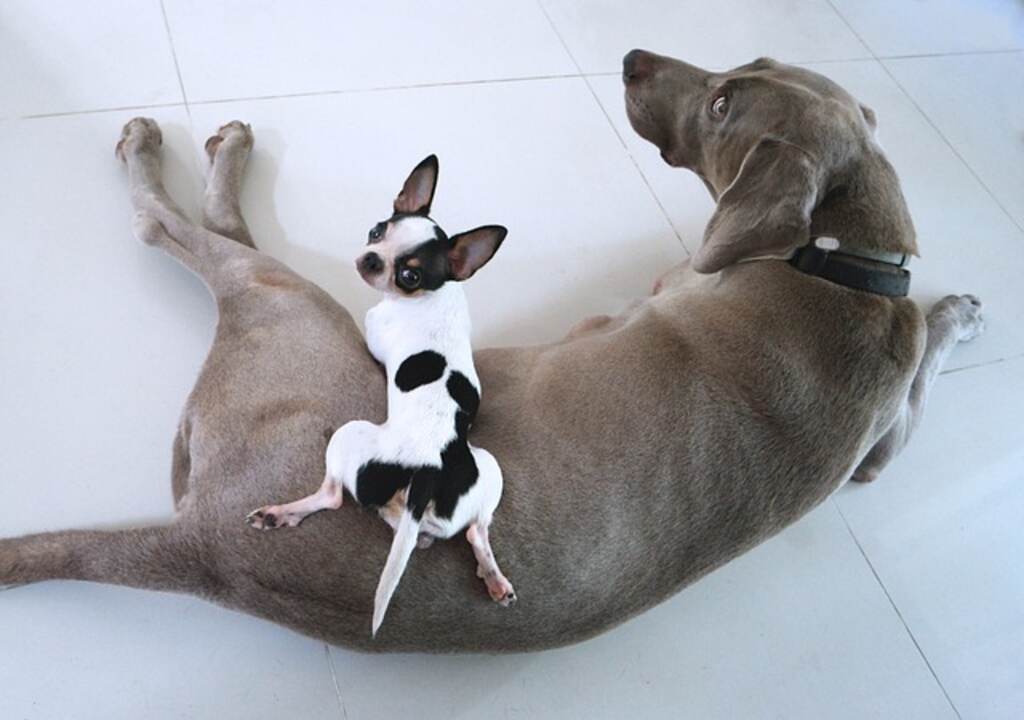When it comes to choosing a pet, one of the biggest decisions you’ll need to make is whether you should get a small dog or a big dog.
There are pros and cons for both sizes, but many people wonder whether small dogs are easier to take care of than their larger counterparts.
In this blog post, we will compare the different requirements for taking care of small and large dogs so that you can decide which size would be best for your lifestyle.
Are small dogs easier to take care of?
Many pet owners may consider a small dog to be less of a hassle to care for than a large one. After all, smaller dogs take up less space in the home and can cost less to feed. They also need fewer walks and are easier to transport in cars.
However, there are some misconceptions about how much work it is to own a small pup. Smaller breeds still require regular grooming, exercise, training, medical checkups, and attention—just like larger breeds do.
Ultimately, when considering whether or not a small or large dog is easier to care for, the answer largely depends on the individual animal and its personality traits—and most importantly its owner’s commitment to proper care.
Why small dogs are better?
Small dogs may not be able to take on the same tasks that bigger dogs can, but they are certainly better companions for many reasons. Firstly, small dogs require less space and resources than big dogs — their smaller size means they need far less food and regular exercise.
Furthermore, small breeds tend to have much longer lifespans; as a result, you get to enjoy your pup’s companionship for longer periods of time. Additionally, small dogs are usually more portable, making it easier to transport them around when needed.
Finally, depending on the breed and temperaments, smaller breeds may be quieter than larger breeds — perfect if you live in a noisy neighborhood or an apartment building with thin walls!
What is the easiest small dog to take care of?
If you’re looking for an easy-to-care-for small dog, there are plenty of breeds that can fit the bill. From toy breeds like Chihuahuas and Pomeranians to slightly larger dogs like Bichons Frisé and Shih Tzus, all these types of dogs tend to be low maintenance when it comes to grooming, exercise and space requirements.
They also tend to have lower energy levels, which means they’re happy with less activity than larger breeds. Some of these small breeds make excellent therapy or emotional support animals – such as Maltese, Cavalier King Charles Spaniels or French Bulldogs – due to their friendly and affectionate natures.
If you’re looking for a small breed pup to bring into your home, research the different types available and pick the one that best fits your lifestyle!
Should i get a big or small dog quiz?
When it comes to deciding whether you should get a big or small dog, the decision can be difficult. If you’re not sure which size is right for your lifestyle and living situation, try taking a quiz! A quiz can help break down the pros and cons of owning either a large or small dog, so that you can decide which one is best suited for your individual needs.
Additionally, quizzes may ask questions about how much time you have to dedicate to your canine companion, what type of home environment you can provide for them, and what activities you’d like to do with them. Answering these questions honestly will enable you to make an informed decision when selecting the perfect pup for your family!
- Do you want a watchdog or just an occasional companion?
- Do you want a breed that is easy to train or one that requires more effort?
- How active do you want your pet to be?
- Would you prefer a breed that needs less attention than others do?
- How many people do you live with?
- How much time do you spend outside each day?
- Do your allergies affect your life in any way?
- Which is better for running and playing fetch? A big dog or a small dog?
- Do you want a dog that will be able to keep up with your energy levels, or one that will lazily lay at your feet while you do all the work?
- Do you want a dog that will be loyal to you, or one that will constantly test your patience? Would you prefer a lively pup who loves to play games and run around, or an obedient one who can stay in one place for hours on end?

Are bigger dogs friendlier?
The age-old debate continues of whether bigger dogs are actually friendlier than small dogs. On one hand, some people say that larger breeds can be more intimidating and less approachable, whereas smaller breeds are often seen as cute and friendly.
However, the reality is that it all comes down to how a particular dog has been raised, socialized and trained. While there may be some generalizations about size in terms of temperament and behavior, each individual dog should be judged on its own merits.
Ultimately, it’s up to the owner to decide based on their own experiences with different sized dogs which breed would best suit their lifestyle.
The Pros and Cons of Owning a Small Dog
Determining whether or not to get a small dog can be an overwhelming decision. Although there are many pros and cons to owning one, the size of your living space, lifestyle and budget should all be taken into consideration. Are small dogs easier to take care of? Let’s explore the pros and cons in more detail.
Pros:
1) Smaller Size: One of the main advantages to owning a smaller dog is that they require less space than larger breeds. If you live in an apartment or townhouse with limited outdoor area for exercise, then a small breed may be ideal for you, as they don’t need much room for running around outdoors like bigger breeds do. Additionally, if you travel frequently, it is easier to transport smaller dogs compared with larger ones!
2) Cheaper Maintenance Costs: Generally speaking, small dogs have fewer health problems than their large counterparts, which makes them cheaper to maintain over time when it comes to vet bills and pet insurance premiums. This also means that food costs tend to be lower too, as these little guys eat significantly less than large breed pooches!
3) Low-Impact Exercise Needs: Smaller breeds typically require less exercise than larger ones because their energy levels aren’t quite so high – this makes them perfect companions if you lead busy lives but still want some canine companionship at home without having too many demands on your time/energy due to regular exercise requirements.
Cons:
1) Potential Noise Levels: Some smaller breeds such as Chihuahuas are known for being very vocal pets, which can make life difficult if noise levels are something that bothers neighbors (or yourself!). Training techniques exist for managing excessive barking, but this does take patience and consistency on behalf of the owner – something worth bearing in mind before getting any type of pet!
2) Overprotection Tendencies: As mentioned previously, some smaller breeds such as Chihuahuas are known for being very protective over “their human” – this can manifest itself through aggressive behavior towards strangers or other animals which could potentially put both people/animals at risk during walks etc., making it important that owners understand how best manage these situations safely should they arise.
3) Higher Rate Of Injury: Being naturally smaller means that injuries occur more often due to falls etc., so extra care needs to be taken when out walking or playing with these types of pups.
Conclusion
After examining the evidence and exploring the pros and cons of small dogs, it is clear that there are both positives and negatives to owning a small dog. The size of the dog makes them easier to transport, less intimidating for younger children, and easier to groom.
On the other hand, they require more supervision because they can become lost or injured easily, may have difficulty living in colder climates due to their size, and are often higher energy than larger breeds. Ultimately, whether or not a small dog is “easier” to take care of depends on your lifestyle and specific needs as an owner.
Small dogs fit different lifestyles better than others – if you’re looking for a low-maintenance companion with minimal grooming requirements who fits into most environments well, then a small breed might be perfect for you!
Related Post: Why Are Small Dogs So Aggressive? (The Truth Revealed)


